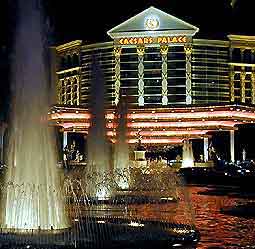
Casino dealers stymied in reaching labor agreement
Employers want to keep union influence at bay
When asked why it has taken unionized dealers more than two years to make progress toward a labor contract at Caesars Palace, a union leader said management was treating dealers like “garbage.”
“These dealers are professional people who take pride in their jobs, but quite frankly, they’re treated like a bunch of second-class citizens,” Joe Carbon, gaming director of the Transport Workers Union, said of Caesars management last month.
It’s the kind of allegation that often surfaces in contentious labor negotiations. But the fact is Las Vegas casino companies have a different attitude toward dealers than they do toward other casino workers.
It’s no secret that companies don’t like unions, which can hamper their ability to fire workers for any reason they find appropriate — provided the reason doesn’t violate federal anti-discrimination laws.
And yet, while all kinds of companies attempt to keep unions at bay, casinos have been especially vehement about their antipathy for dealer unions, says Jeff Waddoups, a labor economist at UNLV.
Estimates are that at least 20,000 people are dealers in the Las Vegas Valley. But while the Culinary Union has made big inroads representing hotel service workers, it has not — by mutual agreement with the casino industry — attempted to organize gaming workers, including dealers. Without support from Las Vegas’ largest union, multiple attempts to organize dealers have failed, and most recently, efforts to negotiate labor contracts at Caesars and Wynn Las Vegas — the only properties where dealers have voted for a union — have sputtered.
At Caesars, for example, management told the union it wants the power to fire or discipline dealers without “just cause.” Management also dug in its heels against any grievance and arbitration procedure, even though such a procedure is typically included in union contracts.
The main reason for casinos’ different view of dealers is those workers literally handle company profits, Waddoups says. Management has long worried about the opportunities for dealers to steal money or otherwise defraud casinos.
And there are other worries, says Bill Eadington, director of the Institute for the Study of Gambling and Commercial Gaming at UNR.
Casinos think they need complete control over dealers to retain the authority to boost productivity, enforce customer service standards and move dealers to certain games on the fly, sometimes at the request of VIP gamblers.
Casinos don’t want table games, where employees handle money, disrupted by requirements that union representatives can second-guess.
“Table games managers want to put fear in the mind of dealers that if they do something wrong, they will be disciplined,” Eadington says. “It’s a rough justice type of situation.”
Most employers in right-to-work states such as Nevada have complete discretion to fire nonunion workers. But dealers complain that kind of control turns a casino floor into a psychological minefield where the slightest mistake could be grounds for discipline.
Casino floors aren’t offices, nor are they like restaurants or retail outlets that sell goods and services. They’re escapist places on sensory overload where emotions run high. Dealers invested in their jobs view themselves as casino ambassadors — customer service representatives who can soften the blow of a big loss, congratulate a player who has won and provide information about the casino depending on how receptive the player is to conversation.
Dealers who have thrived in these high-stress jobs for years say casinos typically don’t fire dealers over a single mistake. If it’s minor enough, dealers get second or third chances to prove their skills. That could change, however, for dealers who complain about other aspects of their jobs to peers or supervisors, they say.
Caesars management shot down the dealers’ attempt to include a provision in the contract that dealers could be fired for theft, according to the union. Dealers say unions can’t protect thieving workers from being terminated, nor should they.
But casinos don’t want to have to prove theft has occurred, Eadington says. Such activities might be difficult to determine, even with surveillance cameras, he added.
Caesars dealers bristle at the notion that they shouldn’t be afforded the same job security as other union workers on the Strip, including cocktail servers, housekeepers and bellhops. (Culinary Union contracts contain a provision that casinos must have “just cause” to fire workers.)
And yet, it should be of little surprise that casinos are reluctant to disrupt the balance of power that has enabled them to staff their floors with “ambassadors” of their liking. And that casino dealers, who gather gamblers’ losses across the table with a smile, have more sensitive jobs than cocktail servers, housekeepers and bellhops.



No comments:
Post a Comment